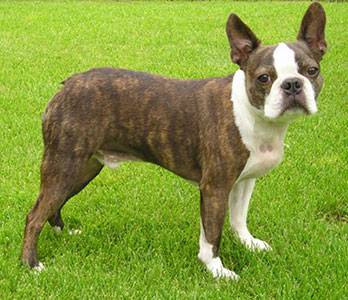Can Boston Terriers breed naturally? Well, let’s dig into this intriguing question together! 🐾
If you’ve ever wondered how these charming little dogs reproduce, you’re in the right place. Boston Terriers, with their big expressive eyes and signature tuxedo-like coat, certainly have a unique charm. But when it comes to breeding, do they need any assistance?
The answer may surprise you! In this article, we’ll explore whether Boston Terriers can breed naturally, taking a closer look at their reproductive abilities. So, let’s dive right in and unravel this mystery! 🕵️♀️🔍
Are Boston Terriers able to breed naturally? Discover the facts about Boston Terrier breeding. While Boston Terriers are a brachycephalic breed, they can still breed naturally in most cases. However, it’s essential to consider potential breeding complications due to their unique respiratory structure. Consult with a veterinarian experienced in Boston Terrier breeding to ensure a safe and successful breeding process.

Can Boston Terriers Breed Naturally? Exploring the Reproduction of Boston Terriers
Boston Terriers are beloved companions known for their friendly nature and distinct appearance. However, there is often confusion surrounding their ability to breed naturally. In this article, we will delve into the topic of Boston Terrier reproduction, addressing common questions and concerns. Whether you are a Boston Terrier owner or simply interested in learning more about these wonderful dogs, this article aims to provide you with a comprehensive understanding of the subject.
The Reproductive Process of Boston Terriers
Understanding the reproductive process of Boston Terriers is essential in determining whether they can breed naturally. Boston Terriers, like all dogs, have a reproductive system comprised of male and female organs. When a male Boston Terrier reaches sexual maturity, typically around six to twelve months of age, he is capable of mating with a female Boston Terrier. The female Boston Terrier experiences reproductive cycles, commonly referred to as heat, during which she is fertile and receptive to breeding. It’s during this time that successful mating can occur. However, it is crucial to consider the specific circumstances and potential challenges that may affect the ability of Boston Terriers to breed naturally.
Genetic Considerations
Genetics play a significant role in the reproductive capabilities of Boston Terriers. One of the primary concerns is their brachycephalic nature, characterized by their flattened faces and shortened airways. This particular conformation can result in respiratory difficulties, which may affect their ability to engage in vigorous physical activity, including mating. Additionally, certain genetic conditions may impact fertility or pose risks during pregnancy. Responsible breeding practices, such as genetic testing and careful selection of breeding pairs, can help mitigate these potential issues and promote healthier litters.
Furthermore, Boston Terriers, like many dog breeds, can experience reproductive health problems. These can include irregular heat cycles, hormonal imbalances, or structural abnormalities of the reproductive organs. It is crucial to consult with a veterinarian experienced in canine reproduction to assess the individual dog’s reproductive health and potential challenges before attempting to breed naturally.
Environmental Factors
While Boston Terriers possess the innate capability to breed naturally, various environmental factors can impact their successful reproduction. External factors such as stress, temperature, and social dynamics can influence breeding behavior and fertility. It is essential to create a conducive environment that promotes healthy reproduction, including providing a quiet and comfortable space, minimizing external stressors, and ensuring appropriate socialization between mating partners. When these environmental factors align, it increases the likelihood of Boston Terriers breeding naturally.
Moreover, when planning to breed Boston Terriers, it is vital to consider the age and health of the individuals involved. Both male and female Boston Terriers should be in optimal health, free from any underlying medical conditions that may hinder their ability to engage in successful mating. Regular veterinary check-ups and pre-breeding examinations can help identify and address any potential health concerns before attempting to breed, ensuring the best chances of a successful natural breeding process.
Benefits of Natural Breeding
While there are alternatives such as artificial insemination and assisted reproductive technologies available, natural breeding offers several benefits for Boston Terriers and their owners. Firstly, natural breeding allows for a stronger bond and natural mating experience between the breeding pair, promoting their overall well-being and satisfaction. Additionally, natural breeding can increase the chances of successful conception as it aligns with the dog’s biological instincts and reproductive processes. Lastly, natural breeding may help propagate healthy genetic diversity within the Boston Terrier population, contributing to the overall long-term health and vitality of the breed.
Tips for Successful Natural Breeding
If you are considering breeding your Boston Terriers naturally, there are several essential tips to keep in mind. Firstly, ensure both the male and female dogs are in optimal health, with regular veterinary check-ups and pre-breeding examinations. Provide a conducive environment for breeding, minimizing stressors and creating a comfortable space. Observe the female Boston Terrier’s heat cycles closely and consult with a veterinarian to determine the best time for breeding. Allow natural mating to occur without excessive intervention or interference, as dogs instinctively know how to engage in the reproductive process. Lastly, be patient and understanding, as not all mating attempts may result in successful breeding.
Conclusion
In conclusion, Boston Terriers can breed naturally under the right circumstances. Understanding the specific genetic considerations and environmental factors can help mitigate potential challenges and promote successful natural breeding. While there are alternative methods available, natural breeding allows for a stronger bond between breeding pairs and aligns with their biological instincts. If you are considering breeding your Boston Terriers, consult with a veterinarian experienced in reproductive health and follow essential tips to increase the chances of successful natural breeding. Remember, the well-being and health of the dogs should always be the top priority.
Key Takeaways: Can Boston Terriers Breed Naturally?
- Boston terriers can breed naturally without any assistance.
- They have a small and compact body size, which makes natural breeding possible.
- Proper health checks and genetic testing should be done before breeding to ensure the well-being of both the male and female Boston terriers.
- Breeding should be supervised by a professional to ensure safe and successful mating.
- Owners should be aware of the potential risks and complications that can arise during the breeding process and seek veterinary assistance if needed.
Frequently Asked Questions
When it comes to breeding Boston Terriers naturally, there are some common queries that arise. Here are the answers to some frequently asked questions on this topic.
1. How do Boston Terriers typically mate and breed?
Boston Terriers, like most dogs, mate through a process called copulation. This involves the male mounting the female from behind to achieve penetration. During this process, the male dog’s penis enlarges and locks inside the female’s vagina, facilitating the transfer of sperm. This mating behavior is a natural instinct for dogs and is essential for breeding.
Breeding Boston Terriers involves finding a suitable mate of the opposite sex, ensuring both dogs are healthy and genetically compatible. It is essential to consult with a veterinarian or professional breeder to guide you through the breeding process and ensure the health and well-being of both the male and female dogs.
2. Can Boston Terriers breed naturally without human intervention?
While Boston Terriers have the ability to mate and breed naturally, certain factors may require human intervention or assistance. Some Boston Terriers may face difficulties in successfully mating due to anatomical variations or health issues such as brachycephalic syndrome. In such cases, artificial insemination or other reproductive techniques may be recommended by a veterinarian to increase the chances of successful breeding.
It is crucial to consult with a veterinarian or a reputable breeder who can evaluate the health and breeding feasibility of your Boston Terrier. They can provide guidance and assistance in ensuring successful natural breeding or exploring alternative methods if required.
3. What should be done to optimize natural breeding success for Boston Terriers?
To increase the chances of successful natural breeding for Boston Terriers, several steps can be taken. Firstly, it is important to ensure that both the male and female dogs are in good health and free from any reproductive issues or genetic conditions that may hinder breeding.
Secondly, timing plays a crucial role. During the female dog’s heat cycle, which typically occurs every six to eight months, breeding should be attempted when she is most receptive, usually around the 10-14 day mark. Monitoring her behavior and consulting with a veterinarian can help determine the optimal time for mating. Lastly, providing a comfortable and stress-free environment for both dogs during the mating process can contribute to successful breeding.
4. Can Boston Terriers breed with other dog breeds?
Boston Terriers can potentially breed with other dog breeds; however, it is generally recommended to mate dogs of the same breed to maintain the characteristic traits and temperament of Boston Terriers. Breeding with different breeds can result in unpredictable offspring with a combination of traits from both parents.
If you are considering cross-breeding with another breed, it is crucial to consult with a veterinarian or a professional breeder well-versed in genetics to understand potential risks and ensure the health and well-being of both the mother and the pups.
5. Is it necessary to breed Boston Terriers?
No, breeding Boston Terriers is not a necessity. Breeding should only be undertaken with careful consideration and a responsible approach. It is important to have a genuine reason for breeding, such as improving the breed, preserving desired traits, or contributing to responsible breeding practices.
If you are not an experienced breeder, it is recommended to leave breeding to professionals who have the knowledge and resources to ensure the health and welfare of the dogs involved. Additionally, it is essential to address the issue of pet overpopulation by spaying or neutering your Boston Terrier if you do not have a specific breeding goal or responsible breeding plan in place.

How to Breed French Bulldog, Frenchton or Boston Terrier Puppies: Breeding Process and Giving Birth
Summary
Hey there! So, can Boston Terriers breed on their own? Well, the answer is no. Boston Terriers often require human intervention to breed because their unique body structure can make natural breeding a bit tricky. Due to their large heads and small pelvises, breeding can sometimes cause health problems for both the mom and the puppies, so it’s important to be careful. Artificial insemination is an option that many breeders choose to ensure healthy offspring.
But don’t worry, this doesn’t mean Boston Terriers can’t have adorable puppies! With the help of veterinary professionals, breeders can use techniques like artificial insemination to make sure healthy puppies are born. It’s essential to prioritize the safety and well-being of these cute and charming pups!
